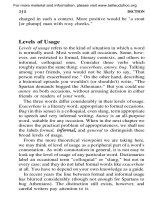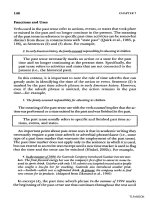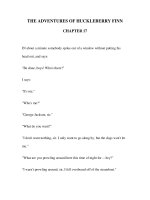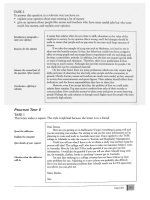Mastering the craft of science writing part 17
Bạn đang xem bản rút gọn của tài liệu. Xem và tải ngay bản đầy đủ của tài liệu tại đây (113.74 KB, 14 trang )
What is your deadline?
All too often, people do not ask for
help until too late, the day before (or of ) the deadline. Too
bad. I would’ve loved to help them. Question number two:
Do you have a reprint from a scholarly journal about this work?
If
so, start there and go through it sentence by sentence, para-
phrasing each unit of thought in your own words. If you
were sitting in my office, that’s what I’d make you do, the
idea being to find out precisely where your understanding
failed—and surprisingly often, that would be all the help
you needed.
Sometimes people decide that they cannot do something:
understand physics, let us say. Then, when they have to do it,
they can only sit there in agony looking at the pieces of
paper—agonizing but not progressing, because they have so
little hope that they never actually come to grips with the
material. They are deer in the headlights.
Paraphrasing for someone like me helps them learn that
they can figure it out, because I won’t let them off the hook
till they hazard a guess—which is right, mostly, or almost
right. If it’s almost right, we look up each unfamiliar word
until they can produce the paraphrase. Great! And on to the
next. And so we go. It may be only minutes before the penny
drops. “This isn’t so bad! I can do this!”
If you are afraid of your subject, is there someone who
could help you in that way? You may know more and under-
stand better than you think. Puzzled writers are often miss-
ing one or two key concepts, ideas so big that nothing makes
sense without them, but not many in number. Once you lo-
cate the gap in your knowledge, you are almost home.
Lacking someone to sit with you, you can push through
alone, though it’s harder because all the will power has to
come from you. If there is a press release, you will have to lean
harder on it—and don’t forget that whoever wrote the press
release should be willing to answer questions. It’s her job.
Even lacking a press release, however, you can go forward,
especially if your article is to be fairly short. Keep looking up
every technical word that came up more than once in your
interviews. Make a vocabulary list and consult it as needed.
After you’ve gone through all the notes, ask yourself, What
seems to be the main idea? Put it in your own words, two to
three sentences worth.
Ask yourself, What seem to be the main three to five ideas
Ideas
into
Words
140
or links in the train of thought? Summarize each one in your
own words, just a sentence or two. Great! There’s your out-
line. Put the ideas in some sensible order and write your ar-
ticle. The next one will be easier.
If you go through all that looking-up and still feel unsure
about your grasp, pick the most teacherly of the people you
talked to and show that person your outline. Probably you’re
okay. If not, the teacher-person will help you untwist the last
few tangles.
An article with such a history might persuade you to make
an exception about showing copy. Of course, you’ll show it
to the teacherly person.
Most people enjoy helping anyone who will make good
use of the help.You must not take someone’s time and then
not write the article—you would feel like a jerk, and the
would-be helper might agree. If you will follow through,
however, do not hesitate to ask for help. Every single person
who has ever accomplished anything has had lots of help, es-
pecially in their early years.
Are you working too hard? Many of us learned in school
that writing was somehow special and difficult, requiring an
outline and a great many rules. The outlines used roman nu-
merals
I. for the main idea
II. for the secondary idea, then
III. A.B.C.s and
a. a.b.c., and at each level you had to have
...
was it three?
I no longer remember the details of Mrs. Richardson’s
nuisancy notions—though it’s obvious that program-
mers do, because beginning with that first I., my com-
puter kept providing a roman numeral every time I hit
Return.
b. And now it’s insisting on a.’s and b.’s, which might have
been handy fifty years ago, but now I need to get out
and back to regular text.
c. H-E-L-P!
d. Mrs. Richardson lives on, the soul of a new machine.
e. In Mrs. Richardson’s classroom, all paragraphs were to
begin with a topic sentence.
f. All sentences were to be complete, with both a subject
and a verb.
When
You’re
Feeling
Stuck
141
g. Subjects and verbs were to agree.
h. Infinitives were not for splitting.
i. Writing was not for enjoying.
After schooling like that, it’s no wonder that many of us tense
up when we sit down to write. But fortunately, the How of
writing is not the heart of the matter, and we all once knew it.
Since you are reading this book, you were probably one of
those children who loved words and ideas and wrote for
pleasure—birthday cards, skits, letters, web sites, and more.
These childish productions can get elaborate. I wrote a shoe-
box full of miniature books, illustrated in crayon, printed in
grimy pencil, and bound in colored paper. A friend, as an
eleven-year-old, invented a town replete with mayor, town
council, and baseball team. He then spent many happy hours
writing the town paper.
Were you also a writing child? I will bet you were, if not
always, then at some period. Whenever it was, it will help
you now to remember what fun you had. Writing can be a
form of play, and when it is, the readers always know, be-
cause they are having fun, too.
Do you think you could collaborate with your inner child?
Let the child write the rough draft and the adult handle
deadlines and grammar.
Do you have an emotional agenda you are not revealing?
You may remember that in chapter 2 I told you not to write
about the subject closest to your heart, “meaning material
that came to you as a revelation, a bolt of lightning that lit
up the entire internal landscape.” I argued that you were too
close to the material to manipulate it and would likely write
with the tone of some unfortunate person ranting on the
subway—as I did myself, when I tried to write about my
heartfelt topic.Wait, I said. Let it season in the basement of
your mind.With so many wonderful things to write about,
why zero in on the one that will be the very hardest? Or, if
you must write about it, why not wait till your skills are
fully developed?
If you could not bear to wait, however, so be it:Your best
hope is to come up front with your agenda and make an ally
of the reader, as Andrew Solomon did in The Noonday Demon, an
Atlas of Depression. Earning the National Book Award is not so
shabby, right?
Ideas
into
Words
142
Blazing emotional intensity cannot be hidden from read-
ers, because they are smart. They will smell the lie and dis-
trust what you say.Your only hope is not to hide it.
Is it possible you’ve not actually been working? Here I am
remembering the classic story that Bob Armbruster, an editor
friend, used to tell about a freelance writer. This writer had a
story long past deadline but was hopelessly blocked. He
could not write and could not write and could not write
until finally one morning his wife presented him with a
mug and a thermos of coffee. Lunch was on a tray, the an-
swering machine was on, and she would take the children
out for the day. Now nothing could interfere with his writ-
ing. And she left, slamming the door.
That evening when the family came home, all the silver
was spread on the dining room table and the writer was
hard at work, polishing forks. “It began to bother me,” he
explained.
Writers always laugh at this story with a certain explosive
quality, I think because it so perfectly describes something
we’ve all done.
So: Have you been silver-polishing?
Any activity counts as silver-polishing that is just worthy
enough to let you stop writing with a straight face. Cleaning
your office, organizing files, returning phone calls, or de-
fragging your hard disk are especially good because you can
delude yourself that they are a necessary precondition to
writing and that therefore, in fact, you are writing, sort of . . .
Are you trying to make the work perfect? If so, that might
explain why you are silver-polishing. As long as something is
not yet written, the possibility remains that it may be per-
fect, or so one is apt to feel.
The classic advice for perfectionists is, “Don’t get it right,
get it written.” In other words, force it. Just write: Bang
something out.
I have used this method and it feels awful—until the next
day, when I would arrive at the office and see that, actually,
the work was not so bad. So I’d patch and polish (always
fun, the exercise of craft), then start a new segment on that
momentum. The next day I could start by polishing yester-
day’s rough edges, and so it went. But to achieve that rhythm,
you must first get something written.You must begin.
When
You’re
Feeling
Stuck
143
At the other extreme, you can limit your writing time,
which is my present approach, since I no longer go to an of-
fice. I tell myself I am going to write for one hour and then
stop. I set an alarm, and when it rings, I STOP—but only in
theory, because I get engrossed. I don’t want to stop, which
is the intended effect. It works like those marriage coun-
selors who instruct a couple in various ways to stimulate
each other, which they are to practice but under no circum-
stances have sex. Of course, they come back the next week
with sheepish grins . . . It seems to be a fact of human nature:
Not having to do the deed makes it possible to start.
On occasions when the alarm rings and I’m not en-
grossed, I do quit, a welcome relief.Yet the single hour is
enough to keep the project cooking in the back of my mind,
so that in a way I am always writing, even when I might ap-
pear to be out in the yard pulling weeds.While one-hour
stints do not work for research, they do for writing.
On the conceptual level, try this idea: Writing is like base-
ball in that what matters is the batting average, not the indi-
vidual at-bat. Face it: Not everything you write will be great.
In fact, some will be terrible. So what? Forgettable stuff gets
forgotten. What people will remember is your good work.
If you are a baseball fan, you know that home-run slug-
gers have low batting averages. They mostly slice that mighty
bat through empty air, while the ball goes whistling by—
much like writers who aim at perfection and publish rarely.
If your temperament leaves you any choice, I suggest you see
yourself as an ordinary hitter, one who just tries to get on
base. Sometimes you succeed, and sometimes you don’t. Ei-
ther way, you keep swinging. And if you keep swinging,
every now and then you will hit one out.
Along the same lines, try a musical image: Did you know
that Bach wrote 255 cantatas? Two hundred fifty-five! Not to
mention all his masses, sonatas, concertos, preludes, and
fugues. Bach was a working stiff, churning out music for the
church as fast as a composition every week. Some of it does
not survive and most pieces are never performed. Today, we
hear only his works of genius, of which we have so many because he
wrote a little something every week.
When you do not like what you have written, don’t worry
about it. Twenty years from now, no one will remember, not
even you. Keep on writing.
Ideas
into
Words
144









